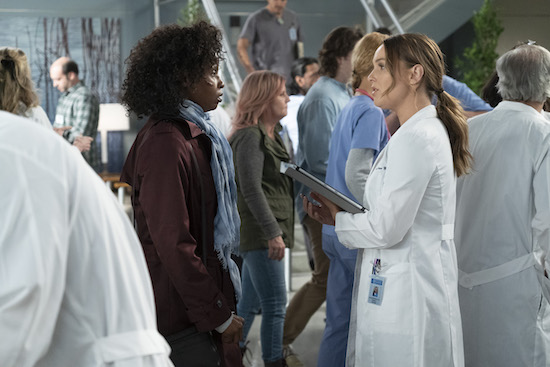GREY’S ANATOMY’s Elisabeth R. Finch and Camilla Luddington Reflect on ‘Silent All These Years’ and its Lasting Impact
September 26, 2019 by Marisa Roffman

GREY’S ANATOMY – “Silent All These Years” – When a trauma patient arrives at Grey Sloan, it forces Jo to confront her past. Meanwhile, Bailey and Ben have to talk to Tuck about dating on “Grey’s Anatomy,” THURSDAY, MARCH 28 (8:00-9:01 p.m. EDT), on The ABC Television Network. (ABC/Eric McCandless)
KHALILAH JOI, CAMILLA LUDDINGTON
As GREY’S ANATOMY kicks off its 16th season, the impact of last season’s pivotal “Silent All These Years” still weighs heavy on the show, as Jo (Camilla Luddington) became depressed upon discovering she was the product of rape.
The episode, which also dealt with a patient who was sexually assaulted, was one of the best hours GREY’S ANATOMY has ever done, delicately handling both the emotional and physical trauma that comes with an attack and its aftermath.
Ahead of its season premiere, Luddington and episode writer Elisabeth R. Finch look back at the hour, and its impact on the series…
When crafting an episode this important, what was the genesis and how did you handle the emotional enormity of it?
Elisabeth R. Finch: When we were watching Dr. Ford give her testimony during the Kavanaugh hearings, it was something that deeply deeply affected all of us on a on a level, I still can’t articulate. And it felt so necessary to counter what we were watching. We were watching somebody stood up and told her truth, and just torn down and in so many ways, and it was so devastating to watch. Most of the time when we are writing GREY’S, it’s from a character place; we very rarely say this is an issue, let’s go tackle this issue. We’ve tackled a lot of important things that go on in the world [but] we don’t start from that place. We start from character. This felt like the world just got the message that consent is irrelevant. And we have the opportunity to change that. So that anger and that devastation—
Camilla Luddington: —manifested into to this. I watched the hearings; I felt like she was dismissed. And I just thought like, no, we’re going to tell this story about what this looks like for women or men. So I email [showrunner] Krista [Vernoff], very pissed and upset that day. Jo’s story of meeting her mother, the backstory, was going to be a completely different thing. And I said, “What do you think about making a story about consent?” And I remember refreshing my email every two seconds, actually, because I was like, she’s going to tell me I’m out of my mind. And that’s not what’s happening. And she just wrote back in all capital letters, “I LOVE IT.” And I was like, “Oh my God, we’re going to do this.” I didn’t know that behind the scenes, her and Elisabeth were having a conversation about the same thing.
Finch: Yeah, because Krista was directing another episode that I had written at the time, and we were half doing the episode, half everyone had their eyes glued to their phones trying to watch it and unpack it. And Krista and I were just enraged, talking about how we wanted to tackle consent because this can’t be the only voice and the only message that’s out there. So it was a really wonderful confluence of events and I loved Camilla’s idea so much. Krista just turned to me and just said, “Okay, so this is the story. Go write it.” And I was like, “Okay. Sure, I’ll get right on it.”
Luddington: And it just took on a life of its own.
What was the energy like on set when you were filming the episode?
Luddington: We all knew it was going to be very powerful. I didn’t know the impact that it’d have now. But I knew that it would be very powerful. On set, it was almost like we were filming an indie movie, because it was a very small cast. And it just felt very intimate, all the time. Debbie Allen made sure it was a very, very safe set for everybody because you’re dealing with such delicate material. But it felt like we’re in a bubble. It almost felt like we weren’t doing GREY’S ANATOMY. It was like we stepped into another world.
Finch: I’ve never experienced anything like that. And Debbie, who directed the episode, just did an extraordinary job of giving everybody the space they needed. I remember very vividly watching when Abby, played by the amazing Khalilah Joi, talks about “If I give them my story and my underwear, is that going to prove all the things I want it to prove?” And I was sitting there watching the screen, and I’m watching the DP crying, I’m watching the ADs that are there in tears. The makeup people. Everyone was just crying over and over and over again. And then they yelled cut and they wipe their tears, and then they go and do their jobs. And then they go watch it again.
Luddington: The same thing happened in rehearsal. We went through the rape kit sequence and we were crying before we even started shooting it. For Kim [Raver] and I, obviously we’re playing doctors, we can’t show our emotion. And it was very difficult, because there was days that I just wanted to sob my way through the entire day. And we would hide between breaks and then get back in.
What surprised you most about the reaction to the episode?
Finch: There’s so much. One of the most surprising things to me is the response that people have to the scene between Ben and Tuck when he is having a conversation about consent. The number of parents that have reached out and said, “I wasn’t sure how I was going to start this conversation with my kid. This is how I’m starting this conversation.” They’re sitting down, they’re watching this episode. This is what’s happening. My friend, who is a high school English teacher in Jersey, asked her superintendent and they all are watching like their entire grade. Grades 10 through 12 are watching it as part of their curriculum; parents have to sign off and say that it’s okay, but they’ve now introduced that into the curriculum, so that they can have their conversation. That was something I didn’t anticipate at all
Luddington: Right. I didn’t think about that either. But even my [now-husband], who is from Indiana, was getting texts from people [back home] saying, “I didn’t think about even having a conversation about consent. I didn’t have that conversation with my parents. Now I’m going to sit down and have them watch the episode”—or not—“and just start this conversation.” So that was definitely one thing.
The other thing that I felt was that people who had been sexually assaulted felt empowered and seen and heard from the episode. That was what was the most remarkable thing to me, is that they felt like, “F— yeah.”
Finch: It continues to blow me away.
This experience fundamentally changed Jo, too. How did it impact the way you see and play her?
Luddington: What’s interesting is Jo has been through so much, and she [traditionally] gets knocked down and gets back up. She’s consistently been able to do that. And this broke her. This is the thing that broke her.
Going into it, I knew that Jo wanted to meet her mother; I knew that because that’s just an instinctual feeling that you know: people want to know who their parents are. I didn’t realize until I was reading the script how much she needed to be loved back. So that was like a surprising discovery for me, because she’s such a tough girl. She has Alex, she has her family, she has her friends, she has her career. And that need was very powerful for her and [she was] completely devastated to know her mother would never want to have a relationship with her.
It sent the trajectory of where she went emotionally into a completely different space. Which was exciting for me to play as an actress, because we’ve never seen Jo like that. I think it was really important to see someone that seemingly has it all get to this dark place where they feel like they have nothing. It’s hard to explain that feeling and to show that story: people need to, in their own time, go and get help. It was an incredible moment for me in the finale and it’s it’s very it’s a satisfying story to play because it’s real.
How did this episode and the response change what stories you were able to tell going into the new season?
Finch: It makes you feel like we can do anything? It really does. I love that we really got to tell a story about somebody who experiences such trauma and then goes to a really dark place despite everything that she has; like [Camilla was] saying [Jo had] it all. And it still breaks her. Watching someone on TV go through that in a realistic way, watching someone go down that rabbit hole and and feel that way and then also ask for help. To not have it be judged and have people who understand—Bailey [is] somebody who’s gone through and needed to ask for help. Meredith has had her dark times, so she’s there.
I love that we get to tell stories that are real, that make people feel seen, that are true, that are so human and that really make an impact. People started to reach out and say I have depression, too. It went from people feeling like they were being seen from a survivor standpoint, to people responding and saying, “I’m getting help for something. I need help for something. I asked for help for something.” And watching other people on Twitter teach one another and educate them about like, “No, no, she’s not just mad at Alex. It’s not that they have a crappy relationship. It’s that it doesn’t matter right now. She’s not okay.”
GREY’S ANATOMY, Season Premiere, Thursday, September 26, 8/7c, ABC
RELATED:
- GREY’S ANATOMY Season 16 Premiere: ‘Nothing Left to Cling To’ Photos
- GREY’S ANATOMY Season 15 Finale: ‘Jump into the Fog’ Photos
- ABC Renews GREY’S ANATOMY, STATION 19, and HOW TO GET AWAY WITH MURDER
- GREY’S ANATOMY: ‘Drawn to the Blood’ Photos
- GREY’S ANATOMY: Kim Raver on Teddy’s Journey and How Being a Part of Shondaland Has Creatively Inspired Her
- GREY’S ANATOMY Season 15: ABC Orders 3 Extra Episodes
Follow @GiveMeMyRemote and @marisaroffman on Twitter for the latest TV news. Connect with other TV fans on GIVE ME MY REMOTE’s official Facebook page.
And be the first to see our exclusive videos by subscribing to our YouTube channel at youtube.com/givememyremotetv
Related Posts
Filed under Grey's Anatomy
Comments Off on GREY’S ANATOMY’s Elisabeth R. Finch and Camilla Luddington Reflect on ‘Silent All These Years’ and its Lasting Impact



Comments